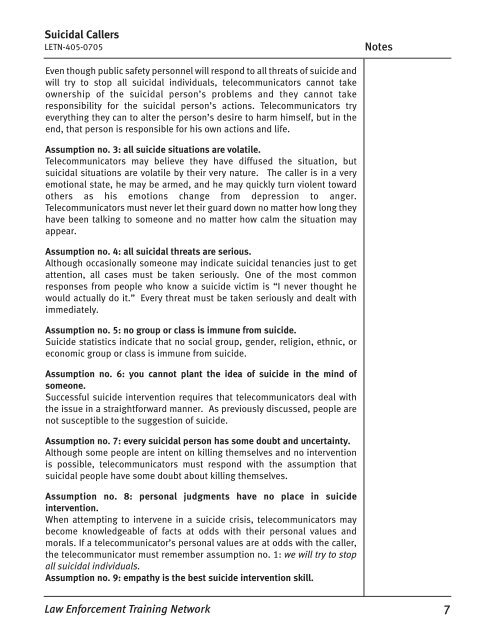Suicidal Callers
Suicidal Callers
Suicidal Callers
- No tags were found...
Create successful ePaper yourself
Turn your PDF publications into a flip-book with our unique Google optimized e-Paper software.
<strong>Suicidal</strong> <strong>Callers</strong>LETN-405-0705NotesEven though public safety personnel will respond to all threats of suicide andwill try to stop all suicidal individuals, telecommunicators cannot takeownership of the suicidal person’s problems and they cannot takeresponsibility for the suicidal person’s actions. Telecommunicators tryeverything they can to alter the person’s desire to harm himself, but in theend, that person is responsible for his own actions and life.Assumption no. 3: all suicide situations are volatile.Telecommunicators may believe they have diffused the situation, butsuicidal situations are volatile by their very nature. The caller is in a veryemotional state, he may be armed, and he may quickly turn violent towardothers as his emotions change from depression to anger.Telecommunicators must never let their guard down no matter how long theyhave been talking to someone and no matter how calm the situation mayappear.Assumption no. 4: all suicidal threats are serious.Although occasionally someone may indicate suicidal tenancies just to getattention, all cases must be taken seriously. One of the most commonresponses from people who know a suicide victim is “I never thought hewould actually do it.” Every threat must be taken seriously and dealt withimmediately.Assumption no. 5: no group or class is immune from suicide.Suicide statistics indicate that no social group, gender, religion, ethnic, oreconomic group or class is immune from suicide.Assumption no. 6: you cannot plant the idea of suicide in the mind ofsomeone.Successful suicide intervention requires that telecommunicators deal withthe issue in a straightforward manner. As previously discussed, people arenot susceptible to the suggestion of suicide.Assumption no. 7: every suicidal person has some doubt and uncertainty.Although some people are intent on killing themselves and no interventionis possible, telecommunicators must respond with the assumption thatsuicidal people have some doubt about killing themselves.Assumption no. 8: personal judgments have no place in suicideintervention.When attempting to intervene in a suicide crisis, telecommunicators maybecome knowledgeable of facts at odds with their personal values andmorals. If a telecommunicator’s personal values are at odds with the caller,the telecommunicator must remember assumption no. 1: we will try to stopall suicidal individuals.Assumption no. 9: empathy is the best suicide intervention skill.Law Enforcement Training Network 7










